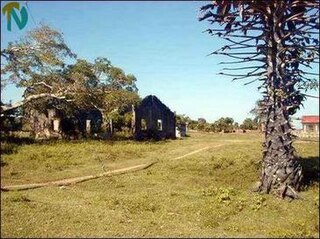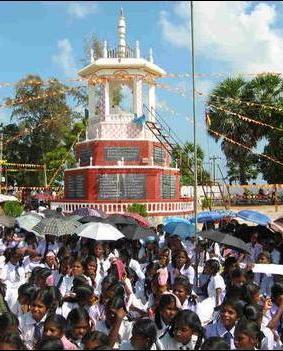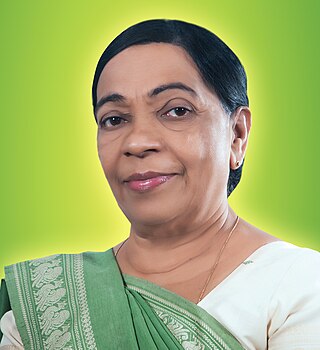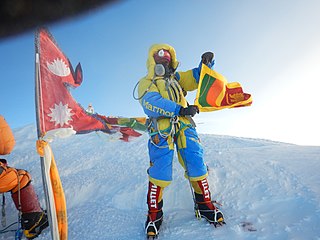Related Research Articles

The Sri Lankan Civil War was a civil war fought in Sri Lanka from 1983 to 2009. Beginning on 23 July 1983, it was an intermittent insurgency against the government by the Liberation Tigers of Tamil Eelam led by Velupillai Prabhakaran. The LTTE fought to create an independent Tamil state called Tamil Eelam in the north-east of the island, due to the continuous discrimination and violent persecution against Sri Lankan Tamils by the Sinhalese-dominated Sri Lanka government.

An enforced disappearance is the secret abduction or imprisonment of a person with the support or acquiescence of a state followed by a refusal to acknowledge the person's fate or whereabouts with the intent of placing the victim outside the protection of the law. Often, forced disappearance implies murder whereby a victim is abducted, may be illegally detained, and is often tortured during interrogation, ultimately killed, and the body disposed of secretly. The party committing the murder has plausible deniability as there is no evidence of the victim's death.

The 1987–1989 JVP insurrection, also known as the 1988–1989 revolt or the JVP troubles, was an armed revolt in Sri Lanka, led by the Marxist–Leninist Janatha Vimukthi Peramuna, against the Government of Sri Lanka. The insurrection, like the previous one in 1971, was unsuccessful. The main phase of the insurrection was a low-intensity conflict that lasted from April 1987 to December 1989. The insurgents led by the JVP resorted to subversion, assassinations, raids, and attacks on military and civilian targets while the Sri Lankan government reacted through counter-insurgency operations to suppress the revolt.
Human rights in Sri Lanka provides for fundamental rights in the country. The Sri Lanka Constitution states that every person is entitled to freedom of thought, conscience and religion, including the freedom to have or to adopt a religion or belief of his choice. And, that every person is equal before the law.
The 1990 Batticaloa massacre, also known as the Sathurukondan massacre, was a massacre of at least 184 minority Sri Lankan Tamil refugees, including infants, from three villages in the Batticaloa District by the Sri Lankan Army on September 9, 1990. Although the government instituted two investigations, no one was ever charged.

Kumarapuram massacre also known as 1996 Trincomalee massacre or 1996 Killiveddy massacre refers to the murder of 26 Sri Lankan Tamil civilians by the Sri Lankan Army soldiers on February 11, 1996. The victims included 13 women and 9 children below the age of 12. Further 28 civilians were severely injured as well. The event took place in a village called Kumarapuram, located in the eastern district of Trincomalee. It was a notable mass murder of civilians since the resumption of armed conflict between rebel forces and Sri Lankan armed forces since April 1995, as part of the Sri Lankan civil war. The then-government arrested a number of soldiers and home guards who allegedly carried out the massacre. A court case was started on 2004. On 27 July 2016 the court acquitted six former army Corporals who were accused over the massacre, after they were found not guilty.

On June 12, 1991, 152 minority Sri Lankan Tamil civilians were massacred by members of the Sri Lankan military in the village Kokkadichcholai near the eastern province town of Batticaloa. The Sri Lankan government instituted a presidential commission to investigate the massacre. The commission found the commanding officer negligent in controlling his troops and recommended that he be removed from office, and identified nineteen other members of the Sri Lankan military to be responsible for mass murder. In a military tribunal that followed in the presidential commission in the capital city of Colombo, all nineteen soldiers were acquitted.
Tens of thousands of people have been disappeared in Sri Lanka since the 1980s. A 1999 study by the United Nations found that Sri Lanka had the second highest number of disappearances in the world and that 12,000 Sri Lankans had disappeared after being detained by the Sri Lankan security forces. A few years earlier the Sri Lankan government had estimated that 17,000 people had disappeared. In 2003 the Red Cross stated that it had received 20,000 complaints of disappearances during the Sri Lankan Civil War of which 9,000 had been resolved but the remaining 11,000 were still being investigated. Amnesty International reported in 2017 that the disappeared persons in Sri Lanka could be between 60,000 and 100,000 since the late 1980s.

Dunuthilaka Mudiyanselage Renuka Menike Herath, commonly known as Renuka Herath, was a prominent Sri Lankan politician and a member of the Parliament of Sri Lanka. She was the Health Minister under President Ranasinghe Premadasa. Renuka Herath was the opposition leader of the Central Provincial Council when she died.
War crimes during the final stages of the Sri Lankan Civil War are war crimes and crimes against humanity which the Sri Lanka Armed Forces and the Liberation Tigers of Tamil Eelam have been accused of committing during the final months of the Sri Lankan Civil War in 2009. The war crimes include attacks on civilians and civilian buildings by both sides; executions of combatants and prisoners by both sides; enforced disappearances by the Sri Lankan military and paramilitary groups backed by them; sexual violence by the Sri Lankan military; the systematic denial of food, medicine, and clean water by the government to civilians trapped in the war zone; child recruitment, hostage taking, use of military equipment in the proximity of civilians and use of forced labor by the Tamil Tigers.
The Lessons Learnt and Reconciliation Commission was a commission of inquiry appointed by Sri Lankan President Mahinda Rajapaksa in May 2010 after the 26-year-long civil war in Sri Lanka to function as a Truth and reconciliation commission. The commission was mandated to investigate the facts and circumstances which led to the failure of the ceasefire agreement made operational on 27 February 2002, the lessons that should be learnt from those events and the institutional, administrative and legislative measures which need to be taken in order to prevent any recurrence of such concerns in the future, and to promote further national unity and reconciliation among all communities. After an 18-month inquiry, the commission submitted its report to the President on 15 November 2011. The report was made public on 16 December 2011, after being tabled in the parliament.

W.J. Basil Fernando is a Sri Lankan jurist, author, poet, human rights activist, editor of Article 2 and Ethics in Action, and a prolific writer. He was educated at St. Anthony's College, Wattala and St. Benedict's College, Kotahena. He earned an LL.B. from the University of Ceylon in 1972, registered as an Attorney-At-Law of the Supreme Court of Sri Lanka in 1980 and practised law in Sri Lanka up to the end of 1989. He became a legal adviser to Vietnamese refugees in a UNHCR-sponsored project in Hong Kong. He joined the United Nations Transitional Authority (UNTAC) in 1992 as a senior human rights officer and later also served as the Chief of Legal Assistance to Cambodia of the UN Centre of Human Rights. He is associated with Asian Human Rights Commission and Asian Legal Resource centre, based in Hong Kong since 1994. In 2014, he was awarded the Right Livelihood Award for "his tireless and outstanding work to support and document the implementation of human rights in Asia."

Angkhana Neelaphaijit, née Angkhana Wongrachen, is a Thai human rights activist, former member of the National Human Rights Commission, and the wife of disappeared human rights lawyer Somchai Neelaphaijit. Amnesty International described her as "a leading human rights defender in Southern Thailand".
The Report of the Secretary-General's Panel of Experts on Accountability in Sri Lanka was a 2011 report produced by a panel of experts appointed by United Nations Secretary-General (UNSG) Ban Ki-moon to advise him on the issue of accountability with regard to any alleged violations of international human rights and humanitarian law during the final stages of the Sri Lankan Civil War. The report is referred to by some as the Darusman Report, after the name of the chairman of the panel.

Bodu Bala Sena, also abbreviated as BBS is a far-right anti-liberalist, and ultranationalist Sinhalese Buddhist organization, and a break-away faction from the right-wing nationalist Jathika Hela Urumaya party. The BBS generally opposes pluralist and democratic ideologies, and criticizes non-extremist Buddhist monks for not taking action against the rise of other religions within Sri Lanka.

The 2013 Commonwealth Heads of Government Meeting was the 23rd Meeting of the Heads of Government of the Commonwealth of Nations. It was held in Colombo, Sri Lanka, from 15 to 17 November 2013. Commonwealth leaders agreed on Sri Lanka as the 2013 host for the meeting when they met in Port of Spain, Trinidad and Tobago, in 2009. Sri Lanka, which was originally slated to host the summit in 2011, was accused of committing atrocities during the Sri Lankan civil war and the summit was instead held in Perth, Australia; Colombo was given the 2013 summit instead. The leaders of Canada, Mauritius, and India boycotted the summit, citing alleged human rights violations by Sri Lanka against its Tamil minority. Protests were also banned during the summit. President Mahinda Rajapaksa summarised the summit's events as: "Issues covered in the communique include development, political values, global threats, challenges and Commonwealth cooperation." However, the meeting was overshadowed by controversy over Sri Lanka's human rights record and the alleged war crimes during the final stages of the civil war. This was the first time in 40 years that the Head of the Commonwealth, Queen Elizabeth II, was not present at the CHOGM.
Mullivaikkal Remembrance Day is a remembrance day observed by Sri Lankan Tamil people to remember those who died in the final stages of the Sri Lankan Civil War. It is held each year on 18 May, the date on which the civil war ended in 2009, and is named after Mullivaikkal, a village on the north-east coast of Sri Lanka which was the scene of the final battle of the civil war.

Jayanthi Kuru-Utumpala is a Sri Lankan women’s rights activist with 20 years of experience and a rock climber / mountaineer for nearly as long. She has worked at national, regional, and global levels as a technical advisor, advocate, trainer, researcher, and programme manager on issues relating to gender, gender-based violence, sexuality, masculinities, women’s human rights, and more recently, women in sports. In 2016, she became the first Sri Lankan to summit Mount Everest. In recognition of this achievement, from 2016-2019 she was appointed the Goodwill Ambassador for Women's Rights by the Sri Lankan Ministry of Women's Affairs. In 2017, she was also included in the BBC’s list of 100 inspiring and influential women from around the world. In 2023, she was the recipient of the International Olympic Committee’s Gender Equality, Diversity and Inclusion Champions Award for Asia(Olympic Council of Asia). Since returning from Everest, she has delivered over 500 motivational speeches, to schools, universities, clubs, professional sports teams, corporate entities, government, and non-governmental organizations, as well as the military and police. She is currently the Gender and Human Rights Advisor at the Family Planning Association in Sri Lanka, working to address stigma and discrimination faced by people seeking HIV services, and is a co-creator of ‘Delete Nothing’ – a local web-based initiative aimed at addressing online gender-based violence in Sri Lanka. Jayanthi serves on several boards and is the current Chairperson of the Women and Media Collective and the International Centre for Ethnic Studies. She is also a trustee of the ‘Women of the World Foundation’, a UK-based charity. Jayanthi holds an MA in Gender Studies from the University of Sussex (UK) and a post graduate diploma in Women’s Studies from the University of Colombo. For more details, find her on LinkedIn.
The May 18 Memorial Foundation is a prominent organization based in the city of Gwangju, South Korea, with a view to commemorate and develop the spirit of struggle and solidarity of the Gwangju Uprising, also known as the May 18 Democratic Uprising and May 18 Gwangju Uprising. The organization was founded in 1994 by the May 18 victims, Gwangju citizens, overseas Koreans and Korean nationals, who believe in promoting the May 18 spirit to respect the sacrifice of the victims, strengthen democracy of modern Korea and to stand in solidarity with the democratic struggles in Asia and beyond.
Sexual violence against Tamils in Sri Lanka has occurred repeatedly during the island's long ethnic conflict. The first instances of rape of Tamil women by Sinhalese mobs were documented during the 1958 anti-Tamil pogrom. This continued in the 1960s with the deployment of the Sri Lankan Army in Jaffna, who were reported to have molested and occasionally raped Tamil women.
References
- 1 2 3 4 5 6 "Clarifying the Past & Commemorating Sri Lanka's Disappeared" (PDF). Human Rights Data Analysis Group. 2007. Archived from the original (PDF) on 28 September 2011. Retrieved 29 May 2011.
- 1 2 3 Vimukthi (8 January 2003). "Seeking justice for the "disappeared"". Sunday Observer. Archived from the original on 16 October 2012. Retrieved 29 May 2011.
- 1 2 3 4 Dushiyanthini Kanagasabapathipillai (28 October 2006). "Commemorating day of the disappeared in Sri Lanka". Tamilweek.com. Archived from the original on December 2, 2010. Retrieved 29 May 2011.
- 1 2 3 4 "The New Idea". Ashoka.org. Archived from the original on 27 August 2011. Retrieved 29 May 2011.
- ↑ "Gwangju Prize for Human Rights". May 18 Memorial Foundation. Archived from the original on 3 June 2011. Retrieved 24 April 2011.